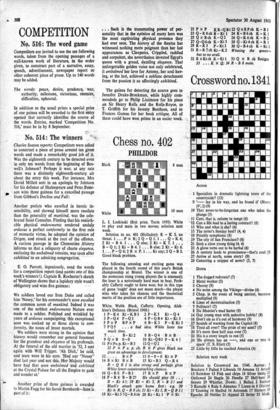No. 514: The winners
Charles Seaton reports: Competitors were asked to construct a piece of prose around ten given words and made a remarkably good job of it. Was the eighteenth century to be detected even in only ten words from the beginning of Bos- well's Johnson? Perhaps it was; at any rate there was a distinctly eighteenth-century air about the entry this week. For instance, Mrs David Millett sent in an apologia by Johnson for his defence of Shakespeare and Peter Peter- son wins three guineas for a cancelled passage from Gibbon's Decline and Fall: Another prelate who excelled in heroic in- sensibility, and showed himself more resolute than the generality of mankind, was the cele- brated Saint Conxolus. Finding that his remark- able physical endowments rendered unduly arduous a perfect conformity to the first rule of monastic virtue, he adopted the opinion of Origen, and struck at the root of the offence. A curious passage in the Clementine History informs us that a reliquary of chaste elegance, enclosing the embalmed remains, was soon after exhibited to an admiring congregation.
E. 0. Parrott, ingeniously, used the words for a competition report (and names one of this week's winners!). Captain R. Rochester's sketch of Wellington shows that a lapidary style wasn't obligatory and wins five guineas: We soldiers loved our Iron Duke and called him 'Nosey,' for his commander's nose excelled the common noses of mankind. Indeed it was one of the noblest endowments Nature ever made to a soldier. Polished and wrinkled by years of arduous campaigning, this exceptional nose was cocked up at those slaves to con- formity, the noses of lesser mortals.
We soldiers were strong in the opinion that history would remember our general foremost for the grandeur and elegance of his proboscis. At the funeral of the old warrior in '52, I met again with Will Trigger. `Ah Dick,' he said, and tears were in his eyes. 'Had our "Nosey" died last year and not this, Her Majesty would have had that nose embalmed and exhibited at the Crystal Palace for all the Empire to gaze and wonder at.'
Another prize of three guineas is awarded to Martin Fagg for his Sarah Bernhardt—here is part of it:
. . . Such is the transmuting power of per- sonality that in the opinion of many hers was the most captivating physical presence they had ever seen. The history of the theatre has witnessed nothing more poignant than her last appearances as Cleopatra. Crippled, raddled and corpulent, she nevertheless invested Egypt's queen with a grand, dazzling elegance. That unforgettable golden voice not only celebrated, it embalmed her love for Antony, her soul hav- ing, at the last, achieved a sublime detachment from the passion it so affectingly exhibited.
The guinea for detecting the source goes to Jennifer Drake-Brockman, while highly corn- mendeds go to Philip Lissimore for his piece on Sir Henry Rolls and the Rolls-Royce, to T. Griffith for his Jeremy Bentham, and to Frances Gomm for her book critique. All of these could have won prizes in an easier week.


































 Previous page
Previous page